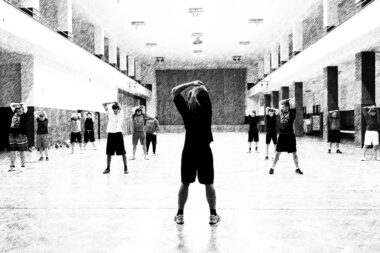Respiratory Muscle Fatigue and Its Effect on Exercise Performance
Respiratory muscle fatigue is a significant aspect of exercise physiology that can greatly influence athletic performance. During prolonged or intense physical activity, the respiratory muscles undergo considerable stress, leading to fatigue. This condition can significantly impact the efficiency of ventilation and gas exchange, ultimately resulting in reduced exercise capacity. When the respiratory muscles, such as the diaphragm and intercostals, tire, there is a marked increase in the work required to breathe. Elevated oxygen consumption by these muscles can divert energy away from the working limbs, potentially impairing performance. Moreover, individuals may experience symptoms such as dyspnea, which can lead to a premature cessation of exercise. Understanding the mechanisms behind respiratory muscle fatigue is crucial for athletes and coaches aiming to optimize performance. Strategies to mitigate its effects include specific respiratory muscle training and the use of ventilatory muscle aids. These interventions can enhance respiratory efficiency, improve endurance, and ultimately support better overall performance during physical activity. The interplay between respiratory fatigue and performance merits continued investigation to fully appreciate its implications for various sports and exercise regimens.
The mechanisms underlying respiratory muscle fatigue are multifaceted and can be influenced by numerous physiological factors. Key contributors include metabolic demand, environmental conditions, and the overall fitness level of the individual. For example, during high-intensity exercises, rapid increases in ventilation rates place excessive demand on the respiratory muscles. This leads to a higher accumulation of metabolic waste products, such as lactic acid, which further contributes to fatigue. Additionally, individuals exercising in high altitudes may experience greater fatigue due to decreased oxygen availability, necessitating increased effort from respiratory muscles. Furthermore, underlying health conditions, such as asthma or chronic obstructive pulmonary disease (COPD), can magnify fatigue effects. It is essential for clinicians and sports professionals to recognize these variables when assessing respiratory muscle function. By identifying specific factors that contribute to fatigue, better strategies can be developed to enhance recovery and optimize training. Ultimately, awareness of these factors can empower athletes to manage their fatigue levels effectively, maintaining performance and minimizing the risk of injury. Continuous assessment during training sessions may provide valuable insights into an athlete’s respiratory health and capacity for enduring intense physical exertion.
Training Methods to Combat Fatigue
Incorporating targeted training methodologies aimed at enhancing respiratory muscle strength and endurance can be beneficial in combating respiratory muscle fatigue. One effective approach involves implementing inspiratory muscle training (IMT), which focuses specifically on strengthening muscles involved in inhalation. This type of training can involve the use of resistance devices that simulate breathing against pressure, thereby increasing the workload on the respiratory muscles. Research has shown that even short sessions of IMT can lead to notable improvements in lung capacity and respiratory muscle endurance. Active recovery techniques, such as controlled breathing exercises, can also facilitate recovery from fatigue after intense workouts. Moreover, aerobic exercises that promote overall cardiovascular fitness contribute to better oxygen delivery and utilization. This not only aids respiratory muscles but also enhances overall athletic performance. Athletes and coaches should incorporate these training methods systematically to monitor progress and adjust as needed. Through consistent practice, athletes can improve their endurance and mitigate the effects of fatigue during competitive events. Furthermore, assessment tools may help to identify optimal training levels for individual needs, enhancing exercise performance effectively.
The assessment of respiratory muscle fatigue can be conducted using various methods, providing valuable insights into an athlete’s performance capabilities. One commonly used technique is the measurement of maximal inspiratory and expiratory pressures (MIP and MEP). These metrics allow clinicians to evaluate the strength of respiratory muscles effectively. Another approach involves the use of electromyography (EMG), which provides real-time data on muscle activation patterns during exercise, highlighting when fatigue occurs. Additionally, perceived exertion scales, where athletes rate their breathing difficulty, can offer subjective insights into fatigue levels. Using a combination of these methods can provide a comprehensive understanding of respiratory performance and highlight areas for improvement. Regular monitoring and assessment may help track changes over time, indicating whether training interventions are having a positive impact. Moreover, this information can empower athletes with knowledge about their respiratory capabilities, fostering self-awareness during training and competition. Ultimately, integrating assessment into the training protocol enables athletes to maximize their strengths while addressing any limitations in their respiratory function, effectively fine-tuning their performance plans.
Role of Nutrition in Recovery
Nutritional strategies play a pivotal role in the recovery from respiratory muscle fatigue. Post-exercise nutrition can significantly influence the recovery process and overall respiratory muscle health. Adequate hydration is crucial, as dehydration can impair muscle function and exacerbate feelings of fatigue. Furthermore, incorporating specific nutrients such as carbohydrates, proteins, vitamins, and minerals is essential for recovery. Carbohydrates help replenish glycogen stores, while proteins offer the building blocks necessary for muscle repair. Additionally, antioxidants found in fruits and vegetables may help combat oxidative stress on respiratory muscles during intense training. The inclusion of these nutrients helps to reduce inflammation and promote quicker recovery, allowing muscles to function optimally in subsequent workouts. It is also advisable to consider meal timing; consuming a balanced meal or snack within the hours following exercise can amplify recovery effects. Athletes should remain mindful of their nutritional habits to support endurance and performance effectively. A tailored nutritional plan may ensure that athletes meet their individual recovery needs and optimize respiratory function through strategic dietary choices. This comprehensive approach to nutrition can lead to overall enhanced performance.
Furthermore, maintaining good respiratory muscle function can also be positively influenced by proper sleep hygiene. Sleep is a critical component of recovery, enabling the body to repair and regenerate. High-quality sleep supports muscle recovery and optimizes neurological function, including the coordination involved in respiration. Lack of adequate rest can exacerbate feelings of fatigue and diminish overall performance during exercise. Implementing a consistent sleep schedule and creating a conducive sleep environment can facilitate better rest. Techniques such as relaxation exercises, meditation, or controlled breathing may also promote improved sleep quality. Athletes should prioritize sleep as a vital part of their training regimen, ensuring that they are well-rested before competitions. Moreover, understanding the relationship between sleep and respiratory function can inform training decisions. For instance, incorporating lighter training days following inadequate sleep may help manage fatigue levels effectively. Monitoring sleep patterns can alert athletes to underlying fatigue issues, prompting careful evaluation of training loads. Overall, making sleep a priority can significantly contribute to enhanced respiratory muscle function, thereby improving exercise performance.
The Future of Respiratory Research
Looking ahead, research into respiratory muscle fatigue and its effects on exercise performance is poised for growth, potentially uncovering innovative strategies for coaches and athletes. Advances in technology, including wearable devices capable of monitoring respiratory rates and muscle activation in real time, will enhance our understanding of individual responses to exercise. These developments may allow for personalized training programs tailored to address specific weaknesses in the respiratory system. Additionally, there is a growing interest in exploring the genetic factors influencing respiratory muscle function and fatigue. Such studies could revolutionize training methodologies by identifying predispositions to fatigue or respiratory conditions among athletes. Furthermore, multidisciplinary approaches integrating biomechanical, physiological, and psychological aspects will likely yield comprehensive models for enhancing performance. The collaboration between researchers, sports scientists, and clinicians can solidify pathways for evidence-based practices that athletes can adopt. Continuous exploration of respiratory performance dynamics offers exciting prospects for enhancing athletic capabilities well into the future. Ultimately, informed interventions can empower athletes to achieve peak performance while effectively managing fatigue levels during their strenuous training and competitive efforts.
In conclusion, understanding respiratory muscle fatigue and its implications in exercise performance is crucial for optimizing training methods and athlete success. With the right assessments, nutritional strategies, recovery techniques, and emerging research, athletes can manage fatigue effectively. It is important for coaches and athletes to recognize the signs of respiratory fatigue and develop personalized strategies for improvement. As awareness of the significance of respiratory function emerges, empowering athletes will foster resilience and endurance through rigorous training programs. Thus, prioritizing respiratory health should be an integral component of athletic training and performance strategies. As ongoing research sheds light on the mechanisms behind fatigue, opportunities for enhancing training interventions will continue to grow, ensuring athletes can perform at their best. With an emphasis on respiratory efficiency, athletes not only improve their psychological capacity for exertion but also enhance physical output during competition. Managing respiratory muscle fatigue strategically leads to greater confidence and improved outcomes. The future of exercise performance lies at the forefront of respiratory research and its promising innovations, ultimately unlocking the potential of athletes across various sports disciplines.





